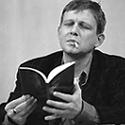Poet
Thomas Kling

Thomas Kling
(Germany, 1957 - 2005)
Biography
Thomas Kling, unquestionably one of the most important German-language poets of the current generation, died on April 1, 2005. At age 47, Kling was already more influential and formative in terms of style than almost any other poet of his generation. As a poet, he was one of the richest in his breadth of material and one of the most powerful in his use of language; on top of that, he was also one of the most controversial essayists in the German literary world of the last fifteen years. His writing ripped German poetry from the existentialist haze of the late 1970s.
Kling wrote with encyclopedias, etymological dictionaries at hand and paintings before him, but without sitting in the archive, gathering dust. A well-grounded knowledge of history, literature, geology, and art history fuses in his poetry by way of harsh treatment with writing techniques from the media age (multiple exposures, polyvalent line breaks, cut-ups, alienation of sound and writing) to form sensual ‘language installations’, as Kling called them, which remain gripping despite all the rich knowledge injected into them.
In ‘taunus sample’, for example, a description of a rowdy bar scene suddenly becomes a political poem, which sees the German past reemerging in a “stormland-”.
In the continuation of one of his most important poems, ‘Manhattan Mouthspace’, written after the September 11, 2001 attack (the first part was written in 1996), Kling dissolves perception and language into one another in the representation of their media transformation: the “continually looping eye”, the “little memoria machine” in combination ultimately turn the poem into an “eye-caricature”, a threnody to a formerly intact world, blast apart.
‘history painting’ is an early example of a painting poem – a genre highly treasured Kling – in which, inspired by the supposed static visual, a dialogue between image and beholder, form and writing is ignited. Here, interstices in interpretation become accelerators of meaning; art as a utopian space that always remains conscious of its precarious position, “a landscape in which it will prosper again.”
The vast polyvocality, the musical foundation of his poetry are brought fully to bear in Kling’s own reading of his work, as can be heard on several CDs and recordings of radio and TV broadcasts.
© Alexander Gumz (Translated by Brian Currid)
BibliographyPoems
erprobung herzstärkender mittel. Düsseldorf: Eremiten-Presse 1986.
Geschmacksverstärker. Poems 1985 – 1988. Frankfurt am Main: Suhrkamp 1989.
Brennstabm. Frankfurt am Main: Suhrkamp 1991.
nacht. sicht. gerät. Frankfurt am Main: Suhrkamp 1993.
erprobung herzstärkender mittel / geschmacksverstärker / brennstabm / nacht. sicht. gerät. Selected Poems 1981 – 1993. Frankfurt am Main: Suhrkamp 1994.
Wände machen. Together with Ute Langanky. Münster: Kleinheinrich 1994.
Morsch. Frankfurt am Main: Suhrkamp 1996.
Das Haar der Berenice / Catullus, Gaius V. Together with Ute Langanky. Ostfildern: edition tertium 1997.
wolkenstein. mobilisierun’. ein monolog. Together with Ute Langanky. Münster: Kleinheinrich 1997.
gelände. Camouflage. Together with Ute Langanky. Münster: Kleinheinrich 1998.
Fernhandel. Poems with CD. Köln: DuMont 1999.
Sondagen. Poems with CD. Köln: DuMont Literaturverlag 2002.
Auswertung der Flugdaten. With a photocycle by Ute Langanky. Köln: DuMont Literatur und Kunst Verlag 2005.
As Editor
Sprachspeicher. 200 Gedichte auf Deutsch vom achten bis zum zwanzigsten Jahrhundert. Eingelagert und moderiert von Thomas Kling. Köln: Dumont Literaturverlag 2001.
Essays
Botenstoffe. Köln: DuMont Literaturverlag 2001.
Itinerar. Frankfurt am Main: Suhrkamp 1997.
Awards
1986 1. Preis beim Nordrhein-Westfälischen Dichtertreffen in Düsseldorf.
1987 Förderpreis für Literatur der Stadt Düsseldorf.
1989 Förderpreis des Landes Nordrhein-Westfalen.
1990 Rolf-Dieter-Brinkmann-Stipendium der Stadt Köln.
1991 Förderpreis des Bundesverb. der Deutschen Industrie.
1993 Else-Lasker-Schüler-Preis für Dichtung Wuppertal.
1996 Peter-Huchel-Preis für den Gedichtband.
2001 Ernst-Jandl-Preis.
2005 d.lit-Literaturpreis der Stadtsparkasse Düsseldorf.
Links
lyrikline
Audio material by Kling.
Poems
Poems of Thomas Kling
Sponsors
























